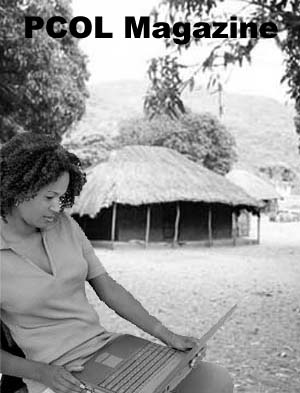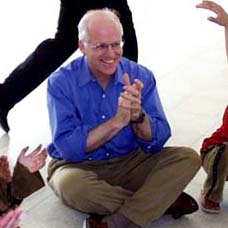
The RPCV Podcast brings you interviews with Returned Peace Corps Volunteers from around the world. Whether you have an interest in a certain region, enjoy world travel, have served or are interested in serving as a Peace Corps Volunteer, the RPCV Podcast will provide you with a unique perspective from volunteers living and working in the far reaches of the globe. The RPCV Podcast is a GSIS original created by first-year MA student Hayden Gore. Hayden—who served with his wife Lisa in the Peace Corps in Guatemala from 2002 to 2004—first came across the idea of educational Podcasts in a newspaper article in 2005. Working at the time as a bi-lingual teacher in Fort Worth, Texas, the idea struck him: why not use the Podcast as a medium through which my students can publish their creative writing pieces before an international audience? To catch everyone up to speed, the Podcast is a digital media format through which anyone with a computer and an internet connection is able to produce audio or video broadcasts and publish them online for viewing by a Web-wide audience. It represents a completely democratic form of journalism and entertainment.
Returned Peace Corps Volunteers Podcast Around the Globe
Returned Peace Corps Volunteers
Podcast Around the Globe
The Returned Peace Corps Volunteer (RPCV) Podcast vividly portrays the experiences of GSIS students who have lived and worked in the far reaches of the globe. Bank robberies, bus crashes, international soccer tournaments: the RPCV Podcast often resembles an action-adventure story, but, as we learn, it is all in a day’s work for volunteers in the United States Peace Corps. Through the RPCV Podcast, anyone in the world with access to a computer and the internet is capable of experiencing a uniquely informative and often quite entertaining account of life as a Peace Corps volunteer.
To catch everyone up to speed, the Podcast is a digital media format through which anyone with a computer and an internet connection is able to produce audio or video broadcasts and publish them online for viewing by a Web-wide audience. It represents a completely democratic form of journalism and entertainment.
You can listen to RPCV Podcasts at:
http://web.mac.com/hayden_lisa/iWeb/biggieblog/RPCVPodcast/RPCVPodcast.html
The RPCV Podcast is a GSIS original created by first-year MA student Hayden Gore. Hayden—who served with his wife Lisa in the Peace Corps in Guatemala from 2002 to 2004—first came across the idea of educational Podcasts in a newspaper article in 2005. Working at the time as a bi-lingual teacher in Fort Worth, Texas, the idea struck him: why not use the Podcast as a medium through which my students can publish their creative writing pieces before an international audience?
This idea proved very successful in his bi-lingual classroom, and when Hayden came to GSIS this past September, he found another ideal application for the Podcast. The many RCPVs at GSIS want to tell their Peace Corps story—the third mission of the Peace Corps is that RPCVs share their experiences upon returning to the United States—and the Podcast format suits this task well.
First, the Podcast’s digital format allows the RPCV to creatively and illustratively concretize their experience; it is attention-grabbing.
Second, the Podcast’s digital format is fluidly shared and efficiently globalized through the internet.
Third, the Podcast allows the RPCV to tell his or her story over and over again to many different people, without actually having to, well, tell their story over and over again. In the busy life of a GSIS student, this is certainly an appreciated convenience.
Hayden has found that the lively RPCV community at GSIS provides no shortage of interesting stories for the Podcast. In fact, Hayden has come across all the intriguing interviewees serendipitously when talking to people before class or at Peace Corps Community events.
For the interview, the RPCV chooses ten to twelve pictures from his or her time spent in the Peace Corps. These pictures guide conversation between Hayden and the RPCV, which Hayden subsequently edits into a narrative. He accomplishes the entire process—from recording to editing to posting online—through his MacBook notebook computer, a capability he finds to be “pretty chill.”
In mid-September, Hayden entertained a full house at the GSIS Cyber Café for the world premiere of the RPCV Podcast. The inaugural Podcast followed RPCVs Jenni and Joe through their experiences living and working in Binaba, a village in the northeast corner of Ghana. Since then, Hayden has published subsequent Podcasts tagging along with Christine in Mali and Alice in Cameroon.
Accessing the RPCV Podcast is quite easy to do. Each RPCV Podcast is available for viewing at Hayden’s RPCV Podcast website. Alternatively, for even greater convenience, any Mac or PC user may download the I-Tunes software for free and then subscribe to the RPCV Podcast. Then, any new RPCV Podcast will automatically download to the user’s computer for viewing as soon as Hayden posts it.
In the immediate future, Hayden plans to continue posting a new RPCV Podcast about every two weeks. Moreover, he is actively in the process of expanding the RPCV Podcast’s audience by establishing the RPCV Podcast in the I-Tunes Music Store, which is the largest and most prominent search engine in the Podcast system. In the longer term, Hayden plans to expand his connections with the greater Peace Corps community and thereby make available the RPCV Podcast as a resource for prospective Peace Corps volunteers.
Whether you work as a professional in an international field, want to learn more about the Peace Corps, enjoy non-fictional narratives, or possess a curiosity about the history, culture, and life of people around the globe, the RPCV Podcast is your window to the unique, insightful, and engaging perspective of returned Peace Corps volunteers.
Says Hayden, “From week to week, you can just bounce around the globe.”
The Peace Corps Community at GSIS is an active community of students, with 47 RCPVs entering GSIS this fall quarter alone. Information on the unique MA degree program and fellowship opportunities available to Peace Corp volunteers, as well as a full list of activities and events may be found at the Peace Corps Community website.
















